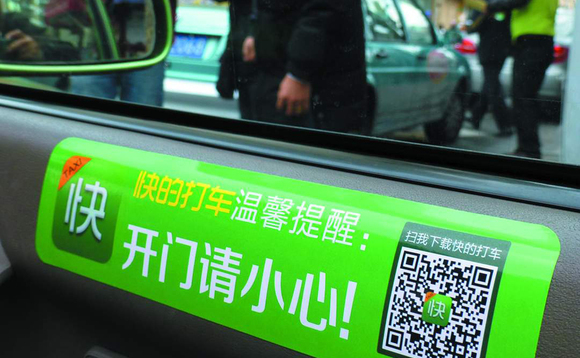
AVCJ Awards 2015: Deal of the Year - Late Stage Technology: Didi Kuaidi

Having raised $3 billion in the largest-ever private funding round for a start-up, newly-merged Didi Kuaidi is looking to put past rivalries behind it
For entrepreneurs who want to address China's mass market, the key is coming up with ideas that are closely aligned to basic human needs: clothing, food, shelter and transportation. Back in 2012, Joe Lee, chief strategy officer and co-founder of Kuaidi Dache, opted for transportation.
"I've been living in China for more than 10 years and transportation has always been an issue. There are two pain points in the system: traffic jams and difficulties getting a cab," he recalls. "I looked at all the transportation-related mobile apps overseas but didn't find anything that was applicable to China. Unlike Western markets, where taking a taxi is premium transportation, cabs in China are very cheap. So I twisted the business model to fit into the local market."
Coming out of the internet industry, Lee and his partners had little idea how to persuade drivers to install their taxi-booking app. They ended up identifying three types of location - airports, low price restaurants and public washrooms - where they could stop drivers and promote the app. A driver waiting for an airport fare might seem an easy target, but the Kuaidi team had trouble getting access.
"We went to the airports but there were all fenced up, so someone used wire cutters and we got into the taxi-waiting zone. It was supposed to be a restricted area, but that's the way it works in China. And that is how we got the first 10,000 drivers to download the app. Entrepreneurship is like that. You should have the power to make things happen," says Lee.
Cutthroat competition
When Kuaidi was launched in China, there were over 40 players at the space, including the company's rival-turned-partner Didi Dache. With copycats in abundance, the market became highly competitive. Kuaidi adopted an aggressive marketing campaign, called a dual-subsidy program. It paid drivers RMB10 each to download the app and another RMB10 to every passenger who placed an order. Didi and the rest soon followed suit.
"At that time we didn't have backing from Alibaba. We paid for the subsidies using our own money - which came from me selling my previous businesses," says Lee. "Our lifeline was calculated by days, it seemed like a clock was counting down. But we did believe that we were adding values to the society, and I told my friends, partners and staff that we should continue."
In time the sheer intensity of competition took its toll. Other players were wiped out, leaving Didi and Kuaidi to fight for control of the taxi-booking space. They had different expansion strategies. While Didi concentrated on major Chinese cities, Kuaidi targeted a broader range of second- and third-tier urban centers like Hangzhou.
Alibaba Group and Tencent Holdings then came in - the former backed Kuaidi and the latter backed Didi - and the scale of the battle began to spiral.
"In 2014 there was a high-profile subsidy war. I think all the players - including Didi, Kuaidi, Alibaba and Tencent - had spent more than RMB3 billion ($467 million) getting users to download the apps," Lee says. "We were being backed by venture capital at the same time. I wouldn't call it burning cash, more a type of educational investment. We were educating people to use something very new and that required us to put in a lot of capital."
Earlier this year, Didi and Kuaidi closed their previous rounds of funding at $700 million and $600 million, respectively. Didi received capital from Temasek Holdings, DST Global, GGV Capital, CITIC Private Equity and others, while Kuaidi won support from the likes of SoftBank and Tiger Global Management.
Around the same time, Jean Liu, daughter of Chuanzhi Liu, chairman of Legend Holdings, joined Didi. She was responsible for initiating the merger talks that, on Valentine's Day 2015, created one of the largest ride-hailing apps in the world.
Primarily a digital intermediary for taxi companies, the combined entity has quickly expanded into car-pooling, vehicle rental, designated driver services, and private car booking that includes rides in Audi and Mercedes-Benz vehicles for high-end customers. The company increasingly finds itself in direct competition with Uber, which also offers a variety of services in China. In September, US-headquartered Uber confirmed that it had raised $1.2 billion for a dedicated China unit.
Didi Kuaidi then finalized a $3 billion funding round, said to be the largest ever fundraise by a private internet start-up globally. New investors included China Investment Corporation (CIC), Ping An Ventures and Capital International. Existing backers, including Alibaba Group, Tencent Holdings, Temasek Holdings and Coatue Management, also participated.
Maturing market
"Without other industry players, there is no way for us to educate the market alone at such a fast pace. You need some sort of competition to draw users' attention and get them to learn about a service and take advantage of it," Lee says. "Competition isn't that bad as you think."
After merger, Didi Kuaidi joined a $350 million round for Southeast Asia's GrabTaxi and then it invested $100 million in US-based Lyft as part of strategic alliance. Three months ago, the combined company invested in Ola as part of a funding round worth $250 million. Finally, this week the four companies announced a global partnership, so that customers of one service can use their local app to order rides when travelling in markets in which other services operate.
In addition, the combined Didi Kuaidi entity has ended subsidies and is looking to create a pricing system based on data generated before the relentless undercutting set it. Lee notes that Kuaidi had come up with a sustainable, profit-oriented business model even before the merger - and it represents a different strategy to Uber.
"We're very grateful to have the support from financial investors," says Lee. "But the world changes. The strategy we used three years ago isn't repeatable. Users have different kind of expectation nowadays regarding the O2O [online-to-offline] services, and you have to come up with different ways to meet those expectations. Simply paying out money to educate the market doesn't work anymore as the untapped opportunities emerged into narrower verticals."
Latest News
Asian GPs slow implementation of ESG policies - survey
Asia-based private equity firms are assigning more dedicated resources to environment, social, and governance (ESG) programmes, but policy changes have slowed in the past 12 months, in part due to concerns raised internally and by LPs, according to a...
Singapore fintech start-up LXA gets $10m seed round
New Enterprise Associates (NEA) has led a USD 10m seed round for Singapore’s LXA, a financial technology start-up launched by a former Asia senior executive at The Blackstone Group.
India's InCred announces $60m round, claims unicorn status
Indian non-bank lender InCred Financial Services said it has received INR 5bn (USD 60m) at a valuation of at least USD 1bn from unnamed investors including “a global private equity fund.”
Insight leads $50m round for Australia's Roller
Insight Partners has led a USD 50m round for Australia’s Roller, a venue management software provider specializing in family fun parks.







